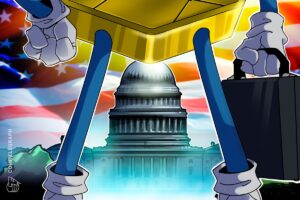Analysis | Why Hong Kong Wants to Be a Hub for the Crypto Sector

Comment on this story
Hong Kong wants to become an international crypto hub even as jurisdictions like the US cast a wary eye on the sector. In August, the first licenses were issued under a new system to regulate crypto exchanges offering trading in tokens like Bitcoin and Ether. The regime is part of Hong Kong’s effort to attract fresh capital and talent back to the city, after its reputation was tarnished by years of harsh Covid-19 curbs and a crackdown on political dissent. Initial reaction was largely positive from digital-asset firms, but there was a lack of major new investment pledges. Hong Kong’s push appears to have quiet backing from Beijing even as mainland China sticks with a ban on crypto trading.
1. What are the regulations?
The new rules mean that retail investors can trade coins on exchanges licensed by the city’s Securities and Futures Commission. Hong Kong says its approach is high on consumer protection, with strict criteria on which virtual assets can be bought and sold. Some of the factors that platforms must consider when deciding on tokens to offer include how long a coin has been in circulation, its market capitalization and average daily trading volume. The tokens must also be incorporated in at least two cryptocurrency indexes from prominent institutions, one with a background in traditional finance. In addition, the SFC mandates that crypto firms must put other safeguards in place before accepting customers, like assessing if users have essential knowledge of digital assets before investing, and setting trading or position limits “with reference to the client’s financial situation.”
2. Why is Hong Kong embracing crypto?
Hong Kong’s policy pivot is part of a wider effort to restore the city’s credentials as a cutting-edge financial hub. It’s a reputation that was put at risk by years of strict Covid-19 restrictions and political unrest, which caused the economy to slow and talent to leave. Financial Secretary Paul Chan called cryptocurrencies and other virtual assets “unstoppable new financial innovations” at an event organized by the Hong Kong Association of Banks in November last year, and said there’s a “need to embrace them.” The government has allowed exchange-traded funds investing in CME Group Bitcoin and Ether futures, and sold its inaugural digital green bonds, which use digital ledgers to make the settlement and coupon payment process faster.
3. Is this Hong Kong’s first foray into crypto?
Hong Kong used to be a digital-asset center in earlier years before taking a more skeptical stance. Exchanges including FTX and Crypto.com (previously known as Monaco) were founded in the city. Prior to the new regulatory regime, the SFC had a voluntary licensing program. Only two exchanges — OSL and HashKey — opted into that legacy framework, which permitted them to provide services solely to professional investors with portfolios of at least HK$8 million ($1 million). Those two also were the first to be licensed under the new regime, seeking what OSL Chief Executive Officer Hugh Madden called a “first-mover advantage.” The rules came after mainland China told platforms to stop trading in cryptocurrencies and banned initial coin offerings, or ICOs, in 2017. The mainland barred crypto transactions and pledged to root out mining of digital assets in September 2021.
4. How significant is mainland China’s prohibition on crypto trading?
One possible risk is that China’s ban could spill over to semi-autonomous Hong Kong. However, Hong Kong regulators have pushed back against this idea, citing the “one country, two systems” principle that permits the former British colony to have its own economic and political system. There are also signs that Hong Kong’s approach could have tacit approval from Beijing. Representatives from China’s Liaison Office and other officials have been spotted at crypto gatherings in the city, according to people familiar with the matter, who also described the encounters as friendly. The low-key support may signal China is keen to use Hong Kong as a testing ground for digital assets. However, Beijing has not indicated any softening of its tight rein on the sector locally amid concern about consumer protection, the potential use of crypto to evade capital controls, and the environmental impact of power-hungry Bitcoin mining.
5. What hurdles remain?
A key issue for crypto firms is regulatory ambiguity. The SFC’s code for digital-asset exchanges says they shouldn’t offer futures or related derivatives, but officials have also indicated they will review their approach to such products. Another challenge is that since the code emerged, the industry has interpreted it as outlawing staking — a popular way of earnings rewards by pledging tokens to help operate a blockchain. Meanwhile, NFTs and utility tokens such as those used for play-to-earn gaming also fall outside the scope of plainly regulated activities. Virtual asset firms operating in these areas need to determine whether their business offerings constitute securities and, if so, require a license. The task is complex and the SFC has indicated decisions will be made on a case-by-case basis. Other obstacles include banking access, as crypto firms face stringent know-your-customer and anti-money laundering rules. The SFC and Hong Kong Monetary Authority have urged lenders to support the sector, and held meetings in April and June to encourage lenders to open accounts for regulated crypto companies. Talent recruitment is another challenge. Responsible officers — who bear the primary responsibility for compliance at a licensed corporation — have been in short supply. Institutional-level crypto traders and developers are also cited as difficult to find.
6. What has been the reception to Hong Kong’s crypto pivot from others?
Hong Kong’s crypto pivot sparked interest from local and foreign firms given the potential for the city to act as conduit for Chinese wealth — if ever the mainland loosens its digital-asset curbs. Companies such as Huobi, OKX and Amber Group said they intended to pursue licenses but no big investment pledges immediately followed the roll out of the new regime. It’s unclear if the regulations are attractive enough to entice firms to invest heavily. The focus on retail-investor protection could dent profitability if areas like margin trading, staking and derivatives remain off-limits. In addition, the crypto market globally is yet to fully recover from its $1.5 trillion rout last year.
More stories like this are available on bloomberg.com
Source link
#Analysis #Hong #Kong #Hub #Crypto #Sector




